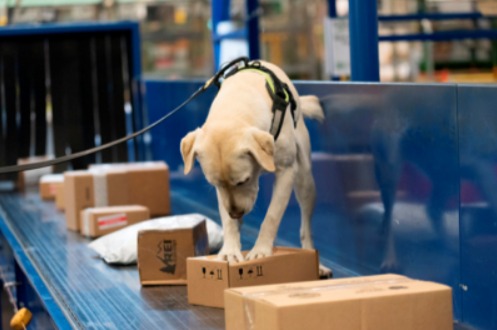
A detector dog working at an Australian airport.
INDONESIA has confirmed it has detected African Swine Fever in North Sumatra, and is investigating pig deaths in some other provinces, as Australia steps up its biosecurity defences.
Minister for Agriculture Bridget McKenzie said in less than a year 32 tonnes of pork has been seized from air travellers and recent testing showed that about half of this contained African Swine Fever.
Ms McKenzie said the Indonesia news was concerning, especially as the country, and particularly the holiday favourite Bali, was popular with Australian tourists.
“There are about 188 flights a week from Indonesia direct into Sydney, Melbourne, Brisbane, Cairns, Perth, Adelaide and Darwin.
“African swine fever kills about 80 percent of the pigs it infects, there’s no cure and no vaccine; and it’s not present in Australia,” she said.
Australians breaking biosecurity face up to 10 years in jail
The minister said her department has already raised the risk status of flights from Indonesia and is increasing screening, interventions and scrutiny of travellers in line with the procedures we use to manage flights arriving from other ASF-affected countries.
“I’d appeal to anyone travelling between Australia and Bali and elsewhere in Indonesia to be extra diligent about declaring what they’re bringing back in—and to clean shoes and any other outdoor equipment.
“This virus is exceptionally hardy and can live in frozen meat for up to two years and in things like blood for six years,” she said.
“It can be spread by people going into an affected area and taking the virus out on their shoes, or through pigs eating scraps that contain affected product.
“We have a zero tolerance approach to people who lie about what they have in their luggage and we’ve refused entry to Australia for six people caught with biosecurity risk material,” Ms McKenzie said.
“If returning Australians do the same, they could face criminal prosecution or civil court action, and be ordered to pay up to $420,000 and be sentenced to up to 10 years in jail.
“That is how seriously we’re taking this threat.”
Ms McKenzie said the Federal Government has already responded to the global disease threat to safeguard the 36,000 jobs that rely on our pork industry and to protect Australia’s international trade, built on a reputation for producing safe food and fibre.
“Bali is a favourite holiday destination for Australians and it’s also a region with a lot of pigs.
“Our government foresaw the threat this disease posed and just last week I announced an extra $66.6 million to put 130 more biosecurity officers at our airports to do half a million more passenger screenings and deploy an extra six detector dogs.”
Two new 3D x-ray machines will be installed at Melbourne and Sydney mail centres and the funding will also pay for a new post border squad to target and identify products brought into Australia for sale that have been incorrectly labelled.
Overseas workers a focus
Indonesians can work temporarily in Australia and seasonal workers from Timor Leste, another country with ASF, are employed under the Seasonal Worker Programme.
A spokesman from the Agriculture, Water and Environment Department said in light of the changing distribution of ASF virus in Asia and parts of Europe, additional activities have been undertaken to ensure our biosecurity measures continue to protect Australia from this disease.
“We’re boosting our biosecurity effort at international airports to target those flights and scrutinise passengers from countries affected by African Swine Fever.
“In recent weeks we undertook an exercise where we checked each and every person arriving on selected flights,” he said.
“Nationally, we’re also working with airlines in countries that have ASF to make sure our requirements are getting through to their passengers.”
The spokesman said the department was also providing information in Timor Leste to high-risk cohorts, like seasonal farm workers, so they don’t bring pork in.

HAVE YOUR SAY